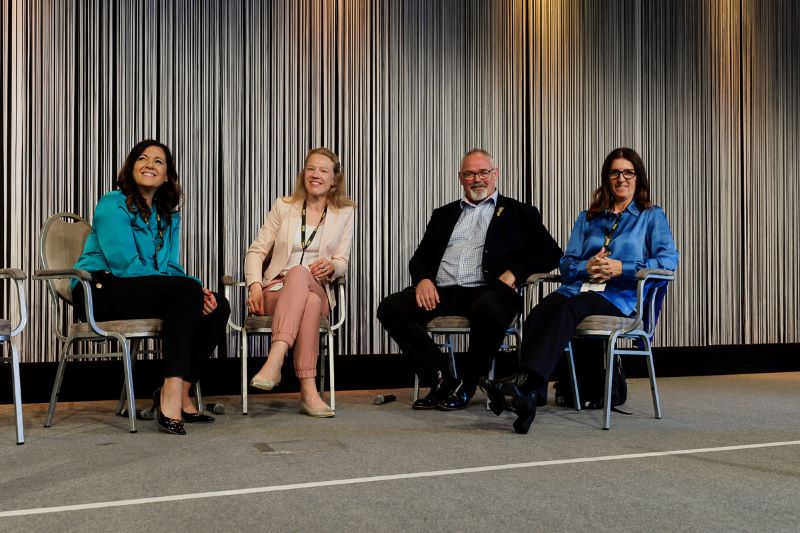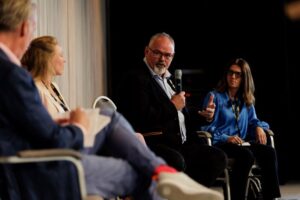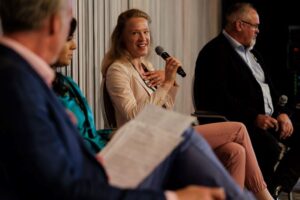At EHS Congress in May, held in Berlin, a panel discussion focused on health and wellbeing and how it can be recognised and monitored on a larger scale in organisations.
The panel included Nadya Kuhl, Head of Occupational Health and Wellbeing at SSE, Kirsten Kuckulenz; Global EHS Manager for Strategic Programs at Siemens AG; Karen J. Hewitt, Director at Leaderlike and Martin Coyd, Group Head of Health and Safety at Beck & Pollitzer. SHP’s Rhianna Sexton attended the event and reports on the discussion.
Professor Dr Andrew Sharman, who was hosting the session, opened with how important it is for organisations to make employees feel comfortable to speak up and trust in their leaders, but added that health and wellbeing strategies and interventions don’t always work.

L-R: Nadya Kuhl, Kirsten Kuckulenz, Martin Coyd and Karen J. Hewitt at EHS Congress.
Alienation of frontline workers
Sharman questioned the panel, asking what HS leaders need to do to engage at an organisational level to integrate wellbeing into the everyday.
Kuhl commented that communication from the top is one issue: “We make decisions at a corporate level…we don’t get the frontline involved. I think once we do have these [wellbeing] initiatives in place, we don’t really follow up with them, we don’t really challenge them to give us data.
“There’s a lot of things we could do if we have pockets of information back…to do more to tackle them.”
Kuhl also added importance on displaying and communicating these initiatives effectively: “When we launch something or put something out, we need to go back to basics.”
She explained how frontline workers may not like or have time to use the internet to fill out a form or scan a QR code which can lead to alienation of the frontline staff – “We need to get in the frontline, put things up around depos and in frontline offices, there’s loads of things out there, we’re just not using them properly.”
Early education
 Coyd turned to the audience and asked them who has had education or training on mental health when they were at school – to which no one raised their hand.
Coyd turned to the audience and asked them who has had education or training on mental health when they were at school – to which no one raised their hand.
He then asked if anyone has been impacted by mental health either personally or through somebody they know – of which nearly all raised their hands – Coyd said: “So we’ve got this basic problem that for some reason, for our generation, it didn’t seem important or people were afraid of discussing this very sensitive thing…education for me is absolutely critical.
“There is still, I believe, something deep within – particularly boards of organisations – on what might happen when they open up this conversation.”
Kuckulenz agreed with both Coyd and Kuhl and said there is often a global vision in an organisation, but that the locality of each base is important to focus on: “The magic is really going down to a local level,” she said.
Inside-out
Hewitt suggested that wellbeing’s focus has usually come from outside of the organisation through people, but that there will be more benefit if they focus on it as an internal strategy and design to begin with: “We’ve got a really good level of maturity now with wellbeing, it’s not the same as it was, people are talking about it, people are more open…but I think what we’ve managed to crack is wellbeing from the outside-in within organisations, and now it’s time to go inside-out.
“So taking what we know, from what people are telling us from the frontline – now look at how we design the organisation so that the burden isn’t on the people…the people managers are taking the strain because the processes aren’t in place that designs wellbeing.”
“If we link up with organisational designers, employee experience, people that are looking at the touch points where we make or break wellbeing, I think that’s where we have the opportunity,” she said.
OSH Professionals do make mistakes
Sharman then moved the discussion on to when OSH professionals get things wrong and what failures the panels have experienced themselves.
 Hewitt said: “Failure to say no can be the hardest thing in an organisation, when you want to do a good job and feel under pressure…or saying yes too quickly and not recognising when it was time to say no for me or the people around me. Although it’s a failure it’s good learning…I’ve had some coaching [on it] myself.”
Hewitt said: “Failure to say no can be the hardest thing in an organisation, when you want to do a good job and feel under pressure…or saying yes too quickly and not recognising when it was time to say no for me or the people around me. Although it’s a failure it’s good learning…I’ve had some coaching [on it] myself.”
Coyd added: “My personal failure is that I was very, very judgmental as a human. I’m from Warrington in the North of England – I have irrational regional pride – it’s a place where when you’re in a coat people think you’re a bit soft.
“I used to judge people. If people didn’t do what I would do, or what I think they should have done at that moment in time, I would judge them and consider them to be perhaps a liability or a weakness.
“I didn’t know, because I had no education, I just expected everyone to behave like me…what I condition myself to do now [as] I still have that judgmental thing in me…but I’ve learned to check myself and say, ‘I wonder’.” He then suggested pausing and asking a person how they are and persisting beyond a surface level response to better understand true feelings and motivations.
Kuhl mentioned the impact of working after hours as a manager: “Things that unconsciously [surface] – I always tell my team, ‘don’t answer your emails’, ‘don’t respond after you’re finished working’, however I’ll email and at the bottom of my emails I’ll put, ‘please do not respond if it’s not your working hours’…and one of my colleagues did respond after hours and I asked her why.” Kuhl explained that the colleague felt that to progress in their career, and to be a manager, they had to replicate the extra hours that she did. In that moment, Kuhl realised she was unknowingly setting a precedent as a manager that encouraged working overtime.
Positive influence
 Sharman concluded by asking the panel what OSH practitioners can do to positively influence the wellbeing strategy in an organisation.
Sharman concluded by asking the panel what OSH practitioners can do to positively influence the wellbeing strategy in an organisation.
Kuckulenz explained how wellbeing should be embedded in the everyday, not something that is a work extra, saying: “Make it a topic for everyone, it’s not only a topic that is driven by us as the experts.”
Hewitt said it is still important to challenge people who are not acting in a way that’s good for other people’s wellbeing, but to reinforce and call out the positive actions employees make towards wellbeing too.
She added that prioritising positive wellbeing drives an organisation’s performance: “In business…what we’re really interested in is organisational performance but if you work back from organisational performance the research shows that the key driver is engagement, experience.”
Looking from another perspective, Coyd mentioned how a global company may find it easier to set up a strategy for wellbeing, whereas smaller companies struggle: “For 25 years I’ve worked in construction and engineering sectors and certainly in the UK 90% of people working in those industries are employed by organisations of less than 10.
“What’s hard is reaching people who don’t have a structure behind them, so the only thing that I’ve got of any value to those people is time. My time. They don’t need my pearls of wisdom. I think we made a mistake in the safety profession (certainly in the UK) by thinking the workforce were all idiots and that we’d write loads of rules for them to follow.
“Just giving them some time and listening, and hopefully at the end of that conversation or series of conversations the person would think ‘actually somebody does care, is interested in me and my wellbeing and my health’. My experience is you tend to get a lot of answers from people,” Coyd said.
What makes us susceptible to burnout?
In this episode of the Safety & Health Podcast, ‘Burnout, stress and being human’, Heather Beach is joined by Stacy Thomson to discuss burnout, perfectionism and how to deal with burnout as an individual, as management and as an organisation.
We provide an insight on how to tackle burnout and why mental health is such a taboo subject, particularly in the workplace.


 Coyd turned to the audience and asked them who has had education or training on mental health when they were at school – to which no one raised their hand.
Coyd turned to the audience and asked them who has had education or training on mental health when they were at school – to which no one raised their hand. Hewitt said: “Failure to say no can be the hardest thing in an organisation, when you want to do a good job and feel under pressure…or saying yes too quickly and not recognising when it was time to say no for me or the people around me. Although it’s a failure it’s good learning…I’ve had some coaching [on it] myself.”
Hewitt said: “Failure to say no can be the hardest thing in an organisation, when you want to do a good job and feel under pressure…or saying yes too quickly and not recognising when it was time to say no for me or the people around me. Although it’s a failure it’s good learning…I’ve had some coaching [on it] myself.” Sharman concluded by asking the panel what OSH practitioners can do to positively influence the wellbeing strategy in an organisation.
Sharman concluded by asking the panel what OSH practitioners can do to positively influence the wellbeing strategy in an organisation.